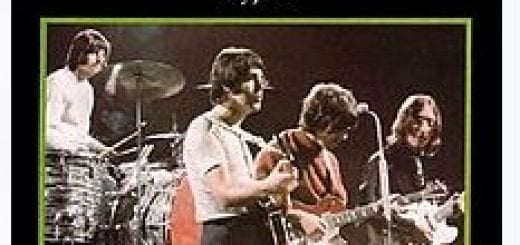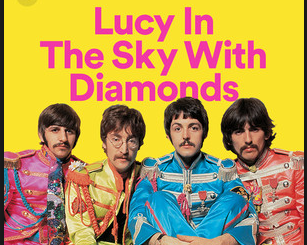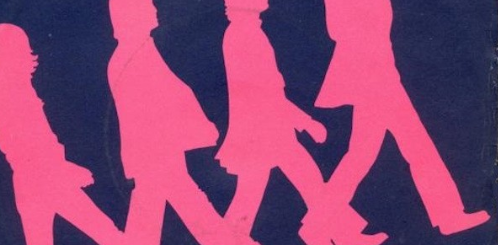“Penny Lane” by The Beatles
It is a well-known fact that the Beatles hail from Liverpool. And this track serves as a shoutout to their ‘hood, specifically a popular street in the city called Penny Lane.
More specifically, the original members of the group, who back then were known as The Quarrymen, were Lennon, McCartney and Harrison. It was Lennon and McCartney who got cool initially, and they formed a musically-based friendship. This was before they blew up, and they were still teenagers who had to ride the bus to get around. And in order for Lennon to get to McCartney’s house and vice versa, they would have to transit at a bus terminus called Penny Lane. So said location became a place where they would meet and chill and thus an important part of Beatles’ history. Therefore this song is largely an exercise in nostalgia which Paul McCartney and John Lennon especially could relate to. And McCartney is relaying his narrative from the partially-fictional perspective of someone situated at the bus terminus.
Twofold Lyrics
But with that established, the lyrics are actually theorized to be twofold. On the most-obvious hand, as stated earlier, they are nostalgic in nature. In other words, McCartney recounts actual locations at Penny Lane. And as stated earlier, he is referring more to a bus station than to the entire road. Many of these recollections are based on scenes he recorded (with pen and paper) on a particular day. However, for the most part it can be said they are more general memories involved, such as the boys’ interactions with girls.
But Beatles’ historians have also pointed out that all things considered, Penny Lane may also be a reference to getting or being high. One prominent individual in the field of Beatles’ analysis even suggested the lyrics are about the first time Lennon and McCartney took LSD, which actually transpired well into their adulthood. But this is not an aspect of the song which most listeners are liable to pick up on. Rather for the most part the lyrics read as if Penny Lane, in all of its intricacies, is a place close to the singer’s heart.
Conclusion
As alluded to earlier not all of the wording is historically accurate, as Mr. McCartney took some creative liberties when weaving his tale. But overall the sentiment being relayed is that just thinking about Penny Lane, as he is basically doing on this track, gives him a pleasant feeling.
Writing Credits
This song was written by Paul McCartney, having penned it at his home in London. Further attribution is given to Lennon-McCartney, a joint entity consisting of Macca and his homey/bandmate, John Lennon (1940-1980). And the track was produced by ‘the Fifth Beatle’, George Martin (1926-2016).
Concerning Lennon-McCartney, John and Paul were such good friends for a time that they would credit each other on one another’s songs. And this was even if the other person didn’t necessarily contribute to its writing. And there is a popular theory that in this particular case it was actually Lennon who wrote perhaps the song’s most famous line. The line in question is: “four of fish and finger pie”.
When was “Penny Lane” released?
This classic was released as a single on 13th of February 1967. The labels behind it are Parlophone Records in the UK and Capitol Records in the US. It came out as a certified double A-side along with another track entitled “Strawberry Fields Forever”. And it was included on the tracklist of the US edition of the Beatles’ album “Magical Mystery Tour” (1967).
“Strawberry Fields Forever” was penned by Lennon. And it was actually Lennon’s creation of that track which spurred McCartney to finish “Penny Lane”, a song he had been conceptualizing for some time prior.
Interestingly enough this track (as well as “Strawberry Fields Forever”) was actually one of the first songs recorded for the Beatles’ signature album, “Sgt. Pepper’s Lonely Hearts Club Band” (1967). But EMI, the conglomerate which owned Capitol Records and Parlophone Records, wanted them to drop a single faster. So that’s why they put them out as singles, on top of the fact that Brian Epstein (1934-1967), their manager, was really feeling them. Moreover, the band had a taboo against featuring pre-released singles on their albums. So that’s why it was not ultimately included on Sgt. Pepper’s or the UK edition of Magical Mystery Tour.
Marketing of “Penny Lane”
The reason EMI rushed the Beatles to get a song out was because they had retired from touring in late 1966 under less-than-favorable circumstances. And EMI was concerned that such, mixed with other factors, was costing the band in terms of popularity.
To further market this classic (along with “Strawberry Fields Forever”), the band’s management came up with the clever idea of producing its own promotional film. And this is cited as one of the earliest models of what we now refer to as music videos.
Promotional Films (Videos)
Said visuals featured the Beatles rockin’ their mustaches for the first time. This caused considerable controversy. And why? Simply due to the fact that during that time facial hair was not a desired look amongst major pop artists.
Peter Goldmann directed these videos, and Tony Bramwell served as their producer.
The promotional film to “Penny Lane” features the Beatles riding horses and wearing red tunics, with the latter likely being inspired by the visual component of the overall Sgt. Pepper project. And the footage does feature shots of Liverpool. However, the scenes in which the Beatles are actually present were filmed in London.
David Mason plays on “Penny Lane”
After its first chorus, Penny Lane features an instrumental solo performed with a piccolo trumpet. The musician who played this solo was David Mason (1926-2011).
Mason’s playing is one of the most-appreciated aspects of the song. In fact it proved to be so effective that even though he wasn’t paid much for the recording itself, it did give him international recognition. Actually said contribution is acknowledged as the signature recording of Mason’s career. And he was a part of many other Beatles’ songs also.
Success of “Penny Lane”
This classic proved to be a major success for the Beatles, despite not reaching number one in the United Kingdom as was their standard. Rather the song peaked at number two in Britain. But it did top America’s renowned Hot 100 and Cash Box Top 100. It also accomplished the same feat on Canada Top Singles. Furthermore, it reached number one in Australia. It also achieved number-1 status in Germany.
Additionally this track has been certified Gold in the United States, back then meaning that it sold at least 1,000,000 copies. And “Penny Lane” also holds a ranking on Rolling Stone’s list of the “500 Greatest Songs of All Time“.
This track was also recognized as a trailblazer for its time of release, setting a trend in which pop music took an unusual slant towards nostalgia.
And of course its success made the actual Penny Lane in Liverpool a lot more popular. In fact even to this day the area around the former bus site in particular serves as a Beatles-based tourist attraction.
The famous barber shop
For the record, the barber shop which Macca references at the beginning of the song was actually called Bioletti’s. And Penny Lane itself has changed much since the days of his youth, which the lyrics are based on. However, it has been noted that even still as of 2020, there is a barber shop in that same location.
Penny Lane’s connection with Slavery
The name Penny Lane has come under fire in recent times, as it has been noted that it was probably derived from the name of a prominent 18th century merchant who traded in slaves. However, the street has not been renamed since more people know it for the Beatles’ song than they do in relation to Liverpool’s and England’s involvement in the Transatlantic Slave Trade.
Ownership of the rights to “Penny Lane”
It is a well-known story in music circles that in the mid-1980s pop superstar Michael Jackson (1958-2009), alongside the Sony Corporation, purchased the rights to a bulk of the Beatles’ tracks. Said deal involved virtually every song written by Lennon and McCartney. However, amidst the handful that were exempted from the agreement was “Penny Lane”. Who did become owner of it was a lady named Catherine Holmes à Court-Mather. Holmes is the daughter of the businessman that bought the Beatles’ catalog (via their publishing company, Northern Songs) in the first place.
FYI:
All members of the Beatles (McCartney, Lennon, Harrison and Starr) and and/or played instruments on “Penny Lane”. It is Macca who serves as the lead vocalist on the track. As such, in addition to serving as a Beatles’ classic, it is also one of the well-known songs in his personal catalog. Simply put, it is one which he performs very often on tour. In fact when the received the White House’s Gershwin Award in 2010, this was one of the tunes performed in tribute to him. And it that particular case it was covered by Elvis Costello.








